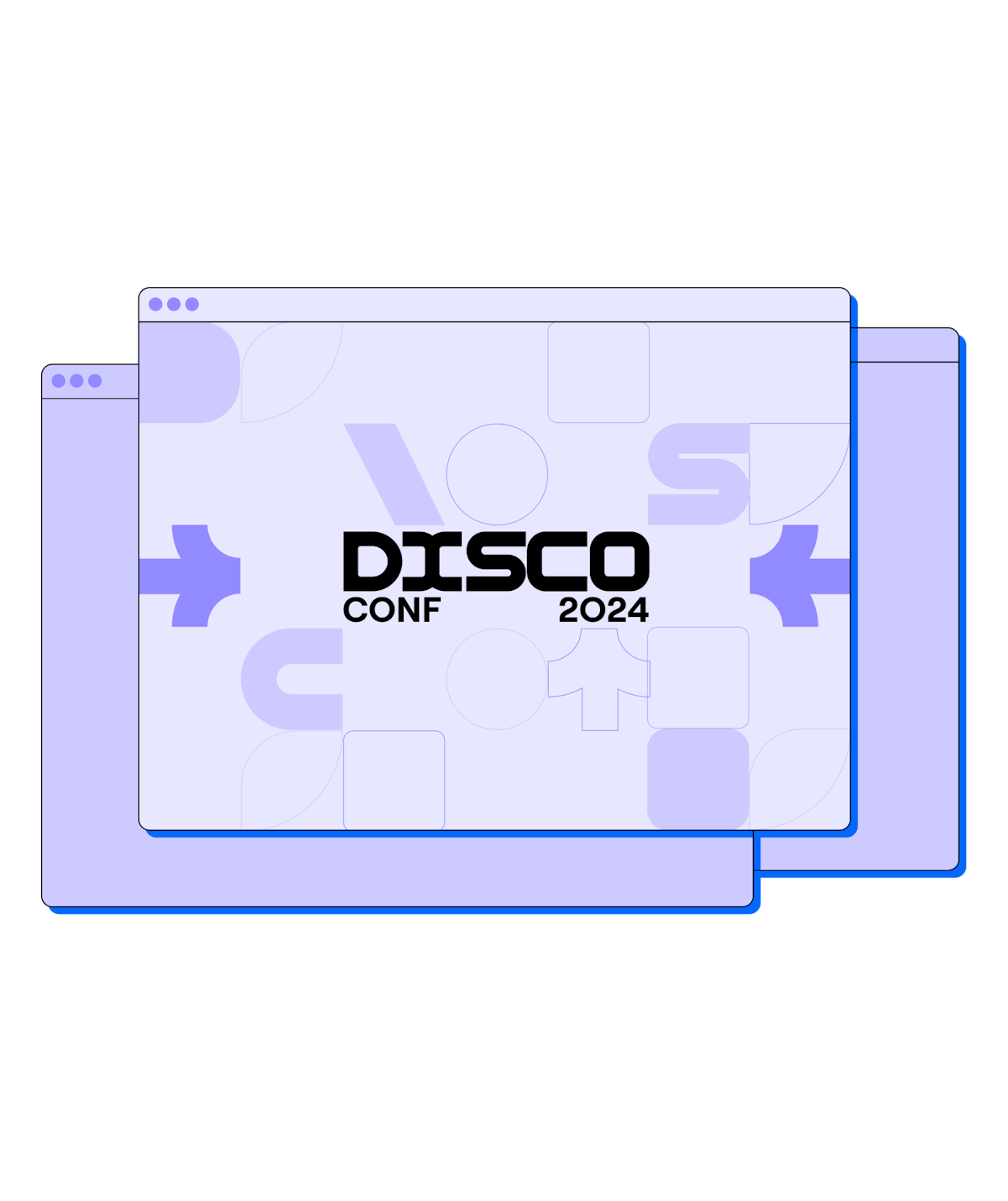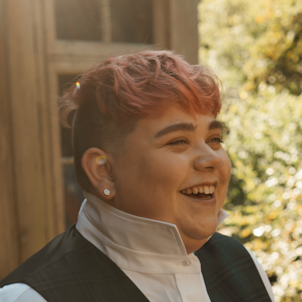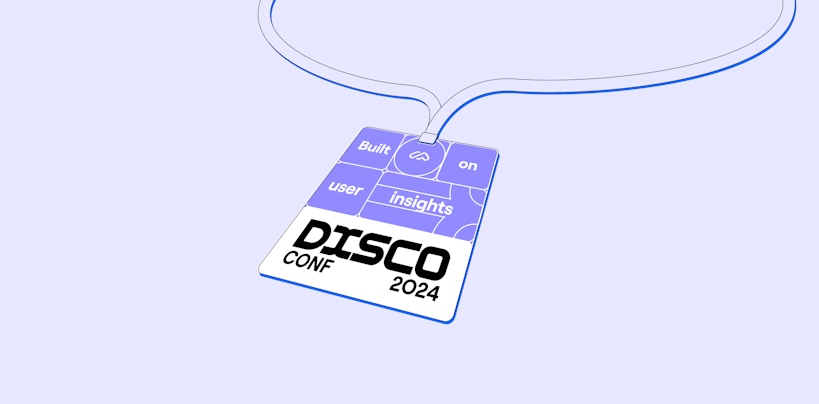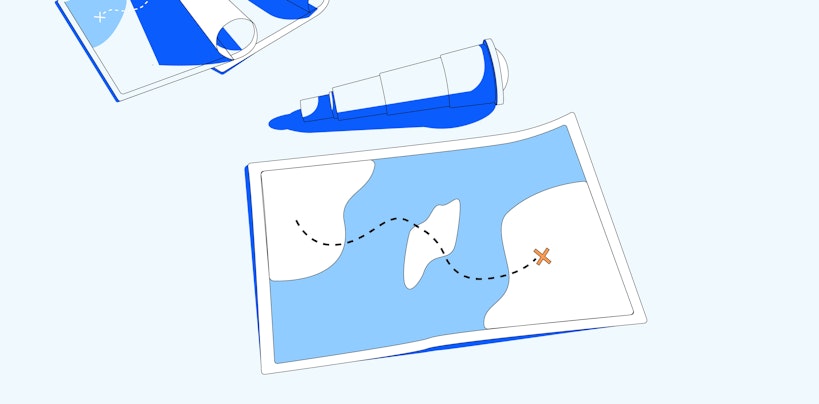While curtains closed on the third Disco Conf just over a month ago, we’re not quite ready to turn off the tunes yet.
Featuring 10 expert speakers from the likes of Dropbox and LinkedIn, Disco Conf 2024 saw over 10 thousand researchers, designers, and product professionals come together from 85+ countries for a day of inspiration and insight.
So whether you couldn’t make it, or need some help dulling the post-Disco blues, we’ve scoured each session for the most memorable, vision board (or board meeting)-worthy quotes.
Let’s dive in.
You can still relive the day in all its glory and watch full VODs of each session for free, right here ❇️
Jo Widawski on the newly-flattened competitive landscape
We stand at a pivotal moment in our industry’s history… As demand for research grows, UX becomes the center of gravity within an organization.

Jo Widawski
CEO & Co-founder at Maze
Share
In Disco Conf 2024’s opening keynote, Maze CEO & Co-founder, Jo Widawski, emphasized the industry’s shift from time-to-market to time-to-right, marking a pivotal moment for product teams.
“AI has fundamentally altered the playing field of product development. In a world where everyone can build fast, speed alone is no longer an advantage.”
“What truly sets companies apart now is their ability to build the right product faster than their competitors. Time-to-right isn’t about racing to market; it’s about racing to understand your users.”
Sharing new features and a preview of the Maze roadmap, Jo revealed how this shift is informing what's new and upcoming for Maze—noting that in a world full of fast talkers, organizations that win will be the ones who are good listeners.
David Hartley-Simon on a measured approach towards AI
The future remains to be seen. We can shape it through our usage—what we decide to adopt, what we regularly use, and how we critique it [AI].

David Hartley-Simon
Research Lead at Rippling
Share
Research Lead at Rippling (ex-Replit, Shopify, Dropbox, Atlassian), David Hartley-Simon, shared a measured perspective on a divisive topic: artificial intelligence. Or, as David suggests we call it, machine intelligence.
David explored the role of AI in nascent design research, covering a brief history of AI, current trends, and key considerations for effective and responsible usage.
Presenting ways AI can be leveraged as an aid (to accelerate tasks), partner (to enhance processes), or tutor (to teach new skills), David offered practical ways we can use machine learning to “replace things that are expensive, timely, or difficult to procure”.
The ultimate lesson was a confronting reminder on AI and the future of research: how AI is used and evolves remains to be seen, and the responsibility lies very much with us.
Andy Warr on lessons learned at Google, Instagram, and Uber
There is nothing more powerful than the people who design, develop, and deliver [products] hearing the needs of their users first hand.

Andy Warr
Director of Portfolio Research & Insights at Dropbox
Share
Andy Warr’s resume reads like a ‘who’s who’ for tech titans: Airtable, Microsoft, Dropbox, Google, Instagram, and Uber. In his session at Disco Conf, Andy shared firsthand anecdotes and lessons learned while navigating research at hyper-growth tech giants.
From understanding where to look for your next feature—“It is much easier to create a solution for a problem, than to create a solution and find a problem”—to how a trip around China changed the game for Uber Eats.
Andy’s session culminates in a lesson on the core ethos for organizations that learn: “Doing research and having a research team is not enough—designers and PMs need to be connecting directly with customers [too].”
Amanda Gelb on being the calm pilot: moving from ticket-taker to partner
You don’t need to influence everyone… You just need to get buy-in from the right people, and understand what’s important to them.

Amanda Gelb
Independent Research (ex-Google, Lyft, Asana)
Share
Using the analogy of piloting a plane through turbulence, Amanda Gelb (ex-Google, Lyft, Asana) steered attendees through a lesson on navigating stakeholder relationships— maintaining control, clarity, and calm in the face of challenges.
Bringing five stakeholder archetypes to life, Amanda offered practical strategies and communication techniques to manage relationships with each persona, and transform tough interactions into collaborative partnerships.
Amanda covers the stakeholder-to-partner pipeline, the importance of “meeting people where they are”, and the three pillars of influence (relationships, organizational understanding, and expertise) needed in stakeholder management.
A key element of Amanda’s advice involved the ‘pre-flight meditation’: an approach encouraging UX professionals to pause before action to ensure they navigate projects and relationships intentionally.
“It is my strong opinion that taking a pause—a deep breath, zooming out, looking around you for the smoothest path—will set you up to be a better partner, and ultimately better at your job.”
Bryanne Peterson on leveling up research impact
UX research has leveled up from a niche side quest to a main storyline, becoming a critical driver of business success. But with great power comes great responsibility… and some tricky boss battles.

Bryanne Peterson
Global Head of Research and Strategy for the VCF Division at Broadcom
Share
In a gamified presentation, Bryanne Peterson, Global Head of Research and Strategy for the VCF Division at Broadcom, shared how to elevate your research practice and drive meaningful change across the organization.
Breaking down the GAME Framework (Genuine Engagement, Agile Education, Maturity in Research, and an Emphasis on Innovation), Bryanne emphasized the importance of cross-team alignment—“we need to align research with the broader mission of our organization, making sure [research] isn't just another side quest.”
Bryanne explored the vital role continuous product discovery brings in the battle to level up: “In this ever evolving game, continuous learning is our secret weapon. The ability to adapt, grow, and innovate is what keeps us from getting stuck on the same level.”
Following a parallel direction to research maturity, Bryanne presented the ‘final boss’—permeating the culture, where researchers must “embed research-driven thinking across the entire organization.”
With a focus on creating playful, interactive experiences that empower teams to utilize customer insights, the GAME framework offers techniques to increase impact and create research ambassadors, from agile education to closing the loop.
“When it’s done right, it [research] becomes part of every team’s DNA.”
Khalida Nicole Sebree on the psychology of storytelling for stakeholder buy-in
Marketers understand that every single interaction with their audience is helping sow the seeds of downstream conversion. Persuasion must be built throughout that entire process.

Khalida Nicole Sebree
UX Researcher at LinkedIn
Share
Serving as an ideal follow-up after Amanda’s session, Khalida Nicole Sebree, Senior UX Researcher at LinkedIn, joined the stakeholder buy-in conversation.
From the psychology behind giving away physical UXR books versus ebooks to posting user insights in Slack with a cliffhanger ending—Khalida walked us through several campaigns used to internally market user research at LinkedIn.
“Looking at [marketing] from the lens of UX research, you can initially build credibility by sharing evidence. This may be quotes, observations, data. It can also be insights into your methodology, relevant market data or process or cost information.”
What stood out as the underlying current through Khalida’s examples was the focus on storytelling. She noted that while technical expertise can open the door—it’s the ability to craft a narrative and compellingly advocate for your research that sets practitioners apart:
“Through educating and engaging stakeholders, you can start creating evangelists who will market for you on your behalf, creating influence throughout your company.”
Ellis Yu on operations as a culture and creativity incubator for design teams
In a nutshell, I believe that DesignOps is doing everything that's non-design and non-research so that designers and researchers can design and research.

Ellis Yu
Design Operations Lead at Plaid
Share
When done right, Design Operations doesn’t have to be complicated—this is Ellis Yu’s mantra.
Demystifying the world of operations, Ellis, Design Operations Lead at Plaid, laid out a clear mission for DesignOps: “To unblock anything that's in our team's way so that they can be more efficient, impactful, and happy.”
Investing in operations can help your teams work smarter and ship better products, faster. And Ellis is clearing up the narrative that operations = rigidity.
“Operations should not result in micromanaging. You don’t want to over engineer everything… When processes are too bureaucratic, they create unnecessary roadblocks… The goal of DesignOps is to support creativity, not hinder it.”
Instead, Ellis advises to focus on streamlining processes and making them adaptable— “There can be perfect harmony between structure and chaos, but the harmony is always shifting because of internal and external variables… Just because something I build works today, it might not work tomorrow. And that's okay.”
Closing off, Ellis presented the key pillars of a DesignOps program that is light lift, big impact. The main pillar, however, might surprise you: “Overlooking culture and being process-centric can result in disengagement within the team. One of the main pillars of DesignOps is to be a culture carrier for your team—cultivating a positive design culture where creativity, collaboration, and empathy are valued."
Ellis’ session feels like a spiritual successor to this unique session from Disco Conf 2023: where Kyle Osborne, Senior Design Researcher at RBC, explores the double-edged sword of empathy in UX. Let us know what you think!
Alison Irvine on how to stop chasing and become an agent of change
Acknowledging that change is a complex, imperfect process sets a stage where failure is safe and true innovation can start.

Alison Irvine
Director, Advance Research at Instructure
Share
We all know that change is the one constant to expect from life—especially if you’re working in product. But according to Alison Irvine, Director of Advance Research at Instructure, change doesn’t have to be quite so scary.
“Whether you're driving or along for the ride, I've found that being able to navigate change is a foundational skill.” Says Alison, whose session outlined key techniques to traverse change on a micro–macro level, and take charge of the changes that impact you.
Alison drew attention to change as a fundamental factor in driving innovation and user-centricity—highlighting that continuous research is fundamental for user-centered design.
“User-centric thinking is not just a buzzword, it's a philosophy we want permeating every level of an organization.”
“Change is inevitable, but it doesn’t have to feel chaotic,” Alison notes. “It’s never going to be perfect… [but] when users are at the center of your strategies and decisions, you’re headed in the right direction.”
TL;DR: To embrace user-centric thinking, researchers must embrace change.
Julia Cowing and Kate Fisher on turning research silos into data synergy
[When you make] Discovery a team sport, people feel heard, which enhances the employee experience—and as a result, the user experience.

Julia Cowing
Principal Research Operations Manager at Esri
Share
In the penultimate session of the day, Julia Cowing, Principal Research Operations Manager at Esri, and Kate Fisher, Senior Design Researcher at Jasper, combined ops with props—covering a framework to breakdown roadblocks and research silos, all while wearing a high-vis jacket and hard hat (yes, really).
Bringing energy and practical takeaways to the stage, Kate and Julia covered techniques to foster collaboration and streamline decisions, noting that conducting product discovery in silos “results in more time aligning than acting”.
Their ultimate goal is what they’ve coined “the trifecta of benefits, realized across the organization”. This trifecta aligns product, people, and customer wins:
- “The product wins because we have actionable feedback that's been validated, ensuring we're focused on the right things.”
- “People win because we're boosting collaboration across teams, encouraging everyone to work together more effectively.”
- “And as a result, the user experience improves and our customers win, making our business thrive.”
Behzod Sirjani and Jo Widawski on the future of research
A beloved Disco Conf tradition, we joined Maze CEO and Co-founder, Jo Widawski, and Behzod Sirjani, Founder at Yet Another Studio, in a fireside chat to discuss the key learnings from Disco Conf 2024, how they reinforce or challenge broader changes in UX research, and their perspectives on the emerging trends shaping discourse as we head into 2025.
With metaphors about horses versus cars and wells versus fresh mountain springs, our closing keynote was full of insightful snippets about the future of organizations that learn.
Talking about the role of research (and researchers), they discussed how we can adapt offensively, rather than defensively, with Behzod saying: “This moment in time feels like an opportunity for us to really rethink what it is that we do and how we show up in doing that really well.”
Bringing us full circle to the opening keynote, Jo and Behzod delivered the empowering message that these changes in how we build products can be a positive for people who do research.
As Jo notes, while AI is changing the game and leveling the product-building playing field, “AI is just a piece of technology—and that is neither a problem nor a solution.” It is how we use it that will determine the champions of our industry.
And so, we’ll leave you with one final quote from Disco Conf 2024…
The future belongs to those who can harness the power of user insights and AI to deeply understand and respond to the ever-changing user needs. It belongs to those who can turn data into insights and insights into groundbreaking products. Ultimately, it belongs to us.
Share
Thanks for coming on this whistlestop recap of Disco Conf 2024 with us—we hope you’ll join us for the journey in 2025!








